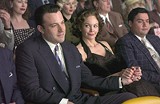[
{
"name": "500x250 Ad",
"insertPoint": "5",
"component": "15667920",
"parentWrapperClass": "",
"requiredCountToDisplay": "1"
}
]
Hollywoodland (R), directed by Allen Coulter, is now playing at Culver Ridge 16, .
Little Theatres, Pittsford Cinemas, Henrietta 18, Webster 12, Tinseltown, Greece Ridge 12, Eastview 13.
The death of Superman
Aside from its ostensible subject --- an examination of the mysterious death of George Reeves, the first actor to portray Superman on television --- the new movie Hollywoodlanddeals with the motion picture industry itself at a special time in its history. A film about Hollywood in the 1950s, it follows the patterns of one of the great American popular genres, the private eye flick, which flourished in that decade, to show a fictional investigation of some actual events. The use of that form seems especially appropriate for a movie about the business of the movies, Hollywood studying Hollywood.
The picture constructs a complicated narrative around what initially seems a relatively simple event, the actor's suicide in 1959. Despite his success playing the Man of Steel, the actor (played by Ben Affleck) understandably felt humiliated when preview audiences so strongly identified him with the role that they laughed at his appearance in From Here to Eternity, crushing his hope for a career beyond the small screen. His messy personal life, which included a long, deteriorating affair with Toni Mannix (Diane Lane), the wife of a top studio executive, and a turbulent relationship with a strident gold digger (Robin Tunney), also apparently contributed to his depression and desperation.
The movie, however, suggests that the police, colluding with the studio that employed Reeves, covered up the truth of the event, which may have been a murder, a possibility that draws the attention of a private detective, Louis Simo (Adrien Brody). One of the seedier practitioners of a profession romanticized in the cinema, Simo tries to hustle money from anyone involved in the death, including the actor's mother, but also feels a need to investigate the case because of the anguish of his young son over the suicide of his hero.
Simo examines the death with a peculiar combination of guesswork, bluffing, and simple dishonesty, intimidating frightened witnesses, conning the gullible, and digging himself ever deeper into trouble of his own. He encounters stonewalling from the police and suffers a beating from studio thugs, but in the best traditions of the genre, doggedly pursues the truth behind conflicting stories and dubious evidence.
The movie constantly interrupts his investigation with a number of other stories, creating a complex narrative out of some relatively simple materials. Intercutting many incidents from the actor's past along with the detective's own memories, it keeps adding new layers of meaning and new connections between the detective and the victim. As Simo keeps revisiting the scene of Reeves' death and discovering new bits of evidence, in a kind of internal Rashomon, he imagines and reimagines new scenarios to explain it, all equally plausible, none completely satisfactory.
Casting Adrien Brody as a private eye, of course, emphasizes the distance between his character and the familiar tough, masculine, ironic figure embodied by actors like Humphrey Bogart and Robert Mitchum. Thin, ill dressed, burdened with melancholy and regret, he nevertheless attains a measure of reality and a kind of sad sincerity throughout his investigation. He stumbles and fails at every turn, but somehow manages to follow the right course and do the right thing in the tradition of his more glamorous and memorable cinematic predecessors.
The behavior of Ben Affleck contrasts strongly with all the other performances, including a fine job by Diane Lane. Soft and puffy, with a weak voice and a set of most awkward mannerisms, he seems more the Man of Fluff than the Man of Steel; whether that interpretation fits the character of Reeves himself constitutes a matter for learned debate.
In its attention to the 1950s the picture also exhibits an understanding of the temper of its time, when the industry faced some drastic changes --- the court-ordered dissolution of the old studio system, the fallout from the days of the blacklist, and personified in George Reeves himself, the competition with television. It also shows something of the ancient story of a young man on the make who reaches a certain pinnacle through luck, pluck, and sheer audacity, but finds that for a variety of reasons he can progress no further. The last moments of George Reeves' career, captured in an eight millimeter home movie by his agent, suggest the terrible pathos of a mediocre artist's final failure.
Latest in Movie Reviews
More by George Grella
-

Film Review: "Cake"
Jan 26, 2015 -

Film Review: "American Sniper"
Jan 19, 2015 -

Film Review: "Inherent Vice"
Jan 12, 2015 - More »






